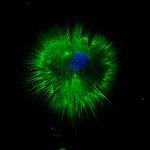Lien vers Pubmed [PMID] – 27577973
J. Pathol. 2016 Aug;
Dynamic control of endothelial cell junctions is essential for vascular homeostasis and angiogenesis. We recently provided genetic evidence that ANGPTL4 is a key regulator of vascular integrity both during developmental and in hypoxia-induced pathological conditions. The purpose of the present study was to decipher the molecular mechanisms through which ANGPTL4 regulates vascular integrity. Using surface plasmon resonance and proximity ligation assays, we show that ANGPTL4 binds integrin αvβ3. In vitro and in vivo functional assays with Angptl4-deficient mice demonstrate that ANGPTL4-αvβ3 interaction is necessary to mediate ANGPTL4 vasoprotective effects. Mechanistically, ANGPTL4-αvβ3 interaction enhances Src recruitment to integrin αvβ3 and inhibits Src signalling downstream of vascular endothelial growth factor receptor 2 (VEFGR2), thereby repressing hypoxia-induced breakdown of VEGFR2-VE-cadherin and VEGFR2-αvβ3 complexes. We further demonstrate that intravitreal injection of recombinant human ANGPTL4 limits vascular permeability and leads to increased adherens junction and tight junction integrity. These findings identify a novel mechanism by which ANGPTL4 counteracts hypoxia-driven vascular permeability through integrin αvβ3 binding, modulation of VEGFR2-Src kinase signalling, and endothelial junction stabilization. We further demonstrate that Angptl4-deficient mice show increased vascular leakage in vivo in a model of laser-induced choroidal neovascularization, indicating that this newly identified ANGPTL4-αvβ3 axis might be a target for pharmaceutical intervention in pathological conditions. Copyright © 2016 Pathological Society of Great Britain and Ireland. Published by John Wiley & Sons, Ltd.
